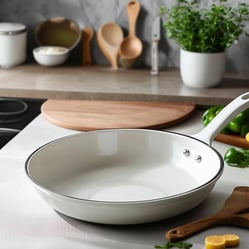Cookware Chronicles
Does it matter what I cook with?
Spoiler alert, it does! Today, we are answering the burning question of "does it matter what materials I cook in?"
We’ll break down the benefits and risks of common cookware materials, so you can confidently choose what to sauté, fry, and simmer in. Because honestly, no one wants a side of toxins with their eggs.
Best Material to Cook In:
Cast Iron
Cast iron is the original cookware powerhouse: durable, versatile, and it even boosts your health. Properly seasoned, it’s naturally nonstick and can add a trace of iron to your food, which is ideal if you need a little mineral boost. It’s not only a kitchen classic but also eco-friendly, as it lasts generations if you treat it well. Make sure you avoid cooking acidic foods in your cast iron. Acidic ingredients like tomatoes, wine, vinegar, and citrus can eat away at the seasoning, making it less nonstick. This can also cause excess amounts of metal to leach into the food.
Pro-tip: Season it well! A seasoned cast iron pan not only prevents sticking but also forms a protective layer that minimizes iron leaching when you don’t need it. This trusty pan is best for searing meats and vegetables.
Stainless Steel
Stainless steel cookware is like your favorite black dress—it never goes out of style and works for any occasion! This material is non-reactive, so it won’t interact with acidic foods or release unwanted chemicals into your meals. It’s lightweight, dishwasher-safe, and built to last, making it a must-have for safe, everyday cooking.
Pro-tip: Avoid cheap stainless steel (like 18/0), as it lacks nickel, which gives durability. Look for 18/8 or 18/10 stainless for the best quality.
Ceramic 
Ceramic cookware, whether fully ceramic or ceramic-coated, is a naturally nonstick option that doesn’t contain PTFE or PFOA, making it a safer non-stick alternative. It’s resistant to high temperatures, won’t leach metals into food, and many consider it the safest option for daily use. While ceramic-coated pans may wear down over time, solid ceramic pans are a long-term, durable investment.
Pro-tip: Go for high-quality ceramic that can withstand wear without chipping, and avoid metal utensils on ceramic-coated cookware to keep it in tip-top shape.
Worst Material to Cook In
Teflon (Non-stick)
Ah, the nonstick pan—every home chef’s initial love affair. But here’s the tea: when heated over 500°F, Teflon (the trade name for polytetrafluoroethylene, or PTFE) starts releasing potentially harmful fumes, including perfluorooctanoic acid (PFOA). This isn’t just hearsay; a study in Environmental Science & Technology linked PFOA exposure to liver issues and hormone disruption. And when your pan inevitably starts to scratch? Those chemicals can go right into your food. Yum.
Pro tip: If you can't resist non-stick, look for newer PFOA-free models, and always keep the heat low.
What Should You Buy? Our Favorite Brands!
Cast Iron
Le Creuset Enameled Cast Iron Square
Le Creuset Enameled Cast Iron Signature Iron Handle Skillet, 10.25"
Lodge 10.25 Inch Cast Iron Pre-Seasoned Skillet
Stainless Steel
Ceramic
And there you have it! Choosing the right cookware can elevate your meals to be healthier and more delicious, while the wrong choice might sneak in some unwanted "extras." So, the next time you sauté, stir-fry, or stew, remember—your cookware is just as important as the ingredients in your recipe!
Written by Chef Mandy
.png?width=280&height=83&name=TinySpoonLogo--w-registered-trademark%20(1).png)












